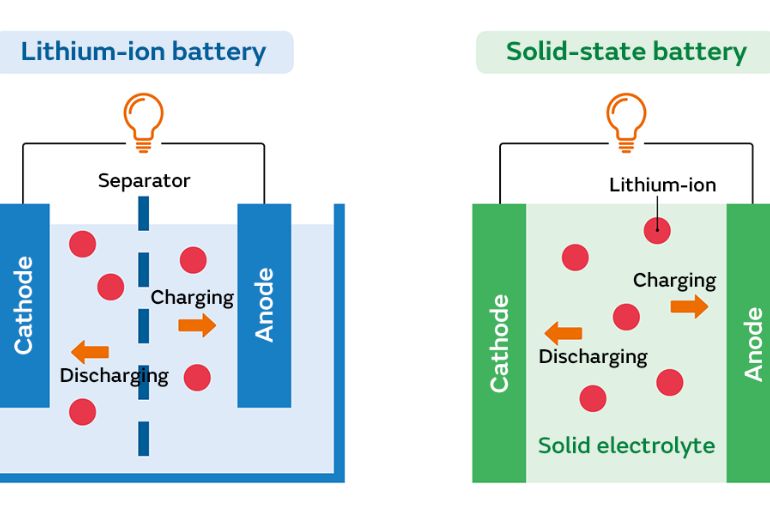Introduction: A New Era in Battery Innovation
As India speeds up its transition to electric vehicles, battery tech is really important. Right now, lithium-ion batteries are the go-to for electric cars. There’s a new player on the block, though—solid-state batteries (SSBs). These batteries can provide more energy, better safety, and faster charging times.
Solid-state batteries are getting a lot of buzz around the world, but India is still working to catch up. Research centers and companies are starting to explore this technology. As more folks make the switch to electric vehicles, solid-state batteries could play an important role in India’s focus on cleaner transportation.
What Are Solid-State Batteries?
Solid-state batteries are a type of battery that uses a solid electrolyte instead of the liquid found in regular lithium-ion batteries. This solid can come from materials like ceramics, polymers, or sulfides.
Here’s why they might be a better option:
Higher energy density: They might be able to double the distance that electric vehicles can travel on one charge.
Increased safety: There’s a lower risk of fires or temperature issues.
Faster charging: With better ion movement, these batteries charge up quicker.
Longer lifespan: They tend to be more durable and last longer.
These benefits address some of the problems with today’s battery tech, which is really important in hot climates like India, where traffic can be heavy.
Why Solid-State Batteries Matter for India
Solid-state batteries could help tackle some of the big issues facing electric vehicles in India:
Safety in the heat: With India’s high temperatures, thermal safety is a big concern. Solid-state batteries are less likely to overheat.
Range worries: With better energy density, these batteries might ease concerns about how far you can drive, especially in areas that don’t have many charging stations.
Smaller sizes: They work well for small electric vehicles and two-wheelers, which are really popular in India.
Better for the environment: They might use less harmful materials, which could help cut down on battery waste.
With these benefits, solid-state batteries look like a good long-term option for India’s diverse and busy transportation needs.
Global Progress in Solid-State Battery Development
Many big car and battery companies are working on solid-state battery (SSB) technology:
- Toyota plans to roll out vehicles with solid-state batteries by 2027-28 and is already testing them.
- QuantumScape, backed by Volkswagen, has some solid prototypes in labs.
- Solid Power is partnering with BMW and Ford to create solid-state battery cells.
- Samsung SDI and CATL are putting money into developing these next-gen batteries.
Even though it might take some time before we see them widely available, the progress is quick, and India could benefit if it plays its cards right.
Current Status of Solid-State Battery Development in India
India isn’t making solid-state batteries on a big scale yet, but some important steps have started.
1. Research from schools and the government
The Central Electrochemical Research Institute (CSIR-CECRI) is looking into battery materials and electrolytes that might help with solid-state batteries. IIT Madras and IIT Delhi are looking into the materials and components needed for these batteries.
2. Startups
As for startups, Log9 Materials in Bengaluru isn’t producing solid-state batteries right now, but they’re creating energy storage solutions that might help develop new materials and chemistries for solid-state batteries in the future.
3. Support from the government
The Production Linked Incentive (PLI) Scheme for Advanced Chemistry Cells (ACC) has a budget of ₹18,100 crore and is available for various battery technologies. While no Indian company has announced a solid-state battery project under this scheme yet, it does allow for other ideas beyond just lithium-ion batteries.
Benefits for the Indian Market
Lower EV costs over time: Making energy use better and increasing battery life.
Better safety in hot weather: More stable designs lower the risk of fires.
Increased range: Important for long-haul trucks and high-end electric cars.
Opportunity for local manufacturing: India can get involved in the global market by focusing on research and production early on.
Challenges to Address
Solid-state batteries have some real challenges that hold them back:
High manufacturing costs: Making these batteries is more expensive because they require special materials and complex processes compared to regular lithium-ion batteries.
Scaling up production: Right now, most projects are still in the testing phase. Setting up manufacturing on a large scale is tough and costly.
Lack of support: In India, there isn’t a solid supply chain for the materials needed to make solid-state batteries, like electrolytes and lithium metal anodes.
Tech maturity: Even with a lot of investment worldwide, solid-state technology isn’t quite ready for mass production yet.
Strategic Opportunities for Indian Businesses
India has an important part to play in the growing solid-state market in a few ways:
Teaming Up: Startups, universities, and research institutes can work together on research and development.
New Materials: We can focus on creating and finding local sources for important components like solid electrolytes.
Testing Projects: We should look at pilot projects in sectors like defense, space, and other high-value areas.
Learning from Others: Partnering with global companies through joint ventures or tech sharing can be really helpful.
It might take a while for India to fully commercialize this tech, but starting to build the right skills now could help us stay competitive in the future.
Conclusion: Planning for the Next Battery Revolution
India has a great chance to be a big player in the solid-state battery scene. These batteries could change the game for how we power electric vehicles. For India, this isn’t just about using new tech; it’s also about shaping it in ways that fit our needs for transportation.
We’re still figuring out how to fully make solid-state batteries happen, but if we invest now in research, teamwork, and building an ecosystem, India can be part of the next wave of growth in electric vehicles.
With support from the government, strong academic programs, and solid corporate research, India could become a leader in battery technology, not just in selling electric vehicles.

